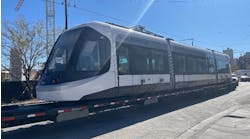Railroad industry met or exceeded the statutory 2018 requirements
The Federal Railroad Administration has released a status update regarding railroads’ self-reported progress toward full implementation of positive train control (PTC) systems as of December 31, 2018. All required railroads either met the December 31, 2018, statutory deadline for fully implementing PTC systems, or submitted requests demonstrating they met or exceeded the statutory criteria for an alternative schedule provided for by law, permitting up to two additional years to complete full implementation.
“PTC will save lives, protect property, and make America’s vast rail network considerably safer. That’s why it’s so important that all 41 railroads meet the Congressionally mandated deadline of December 31, 2020,” said U.S. Secretary of Transportation Elaine L. Chao.
Based upon the latest self-reported data, current as of December 31, 2018, four railroads have fully implemented PTC systems on their required main lines, and all other railroads subject to the Congressional PTC mandate satisfied the six statutory criteria necessary to qualify for an extension. Notably, Quarter 4 data also show PTC systems are in operation on almost 46,000 of the nearly 58,000 route miles where the technology systems must be deployed, and PTC systems are in revenue service demonstration on an additional 288 route miles.
By the end of 2018, all necessary PTC system hardware had been installed, radio spectrum acquired, employees trained, and testing initiated. The key remaining steps for full implementation include conducting revenue service demonstration (advanced testing on the general rail system), submitting a PTC Safety Plan and obtaining PTC System Certification from FRA, achieving interoperability between host railroads and tenant railroads, and activating the PTC system so it governs all operations on the required main lines.
As of December 31, 2018, host railroads’ operations are governed by a PTC system on 83 percent of the freight railroad route miles subject to the mandate and 30 percent of the required passenger railroad route miles. Of approximately 233 host-tenant railroad relationships, 16 percent have reportedly achieved PTC system interoperability as of December 31, 2018, which means the locomotives of a host railroad and a tenant railroad operating on the same main line can communicate with and respond to the PTC system, including uninterrupted movements over property boundaries. In addition, FRA has conditionally certified 12 host railroads’ PTC systems, based on their PTC Safety Plans; two PTC Safety Plans are currently under review; and 23 additional PTC Safety Plans must be submitted by June 2020.
“PTC is the most significant and complex infrastructure investment America’s railroads have ever undertaken,” said FRA Administrator Ronald L. Batory. “Operating and maintaining a safe and reliable national rail network while instituting PTC is paramount. FRA will continue to work with a sense of urgency to ensure all railroads, particularly commuter railroads, remain focused and vigilant in satisfying key deadlines ahead.”
On February 6, 2019, FRA convened the first of six PTC Collaboration Sessions planned through 2020 with all railroads responsible for implementing PTC under the congressional mandate, and major industry associations. At the session, FRA safety specialists outlined major steps the industry must accomplish within the next two years. In addition, FRA explained its approach to certifying railroads’ PTC systems and answered technical questions.
As of December 31, 2018, 33 railroads had submitted a written notification formally requesting FRA’s review and approval of an alternative schedule and sequence, and as of February 11, 2019, FRA has formally approved 25 requests.
The latest data show significant progress from just a year earlier when 15 railroads were considered ‘at risk’ of not implementing PTC or qualifying for an extension. In 2018, FRA made $250 million in grant funding available for PTC implementation, and now four railroads—the Port Authority Trans-Hudson (PATH), North County Transit District, Portland & Western Railroad, and the Southern California Regional Rail Authority (Metrolink)—have self-reported that they fully implemented an FRA-certified and interoperable PTC system on all their required main lines.


